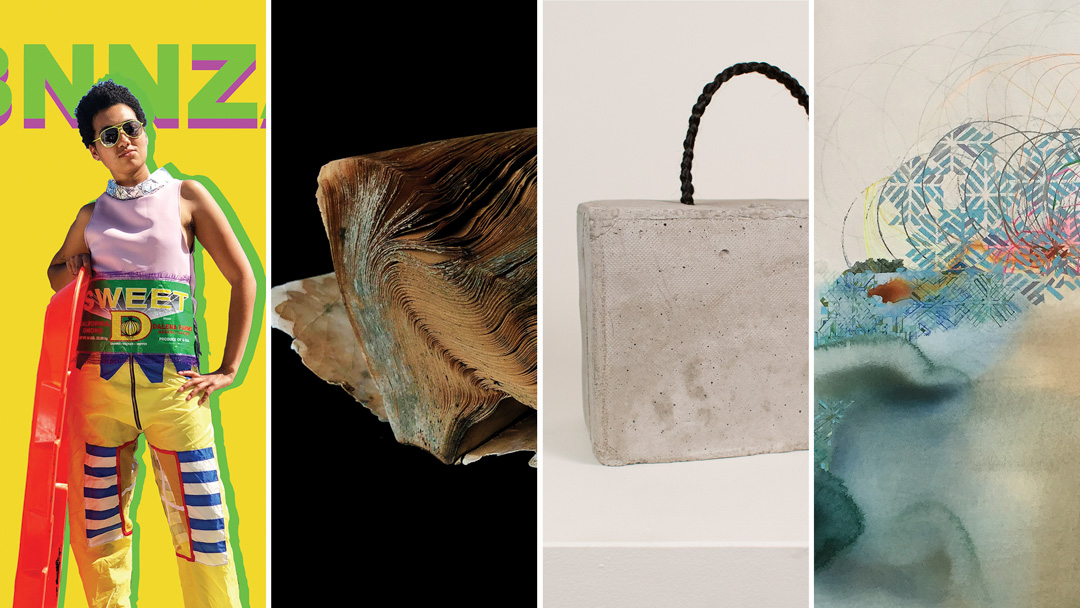
August 14, 2018
FOR IMMEDIATE RELEASE
San Francisco, CA—The Artist in Residence Program at Recology San Francisco will host an exhibition and reception for current artists-in-residence Bonanza, Kari Orvik, and San Francisco City College student artist Rabbit Garcia, and special residency artists Hughen/Starkweather on Friday, September 21, from 5-8pm, and Saturday, September 22, from 1-3pm. Additional viewing hours will be held on Tuesday, September 25, from 5-7pm, with a gallery walk-through with the artists at 6pm. This exhibition will be the culmination of four months of work by the artists who have scavenged materials from the dump, or responded to the Recology site, to make art and promote recycling and reuse.
Bonanza
The Young and the Restless
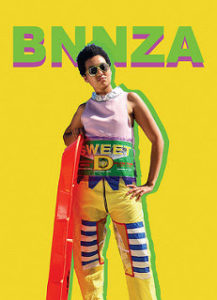 Get ready for The Young and the Restless, the newest line of clothing from BNNZA, the fashion brand of the artists of Bonanza. Inspired by a collection of late 90s R&B CDs, found while scavenging, the line draws on themes of self-expressive high school prom outfits, as well as the fashion and pop culture of the late 90s/early 2000s.
Get ready for The Young and the Restless, the newest line of clothing from BNNZA, the fashion brand of the artists of Bonanza. Inspired by a collection of late 90s R&B CDs, found while scavenging, the line draws on themes of self-expressive high school prom outfits, as well as the fashion and pop culture of the late 90s/early 2000s.
The artists turn vivid blue tarps and Ikea bags into statement piece ball gowns. Baggy athletic pants and oversized necklaces are reinvisioned using Lowe’s construction debris sacks and bike lock chains, and Bob the Builder and troll dolls are just two of the millennial-era touchstones. With an emphasis on play, and a jab at consumerism, Bonanza’s garments are part high-end, part homemade, and all dump. On Friday night at 6 and 7pm models will strut a catwalk made from salvaged lumber in the art studio side yard to beats DJed from the found CDs. Sculptural installations will be sited in the gallery and throughout the evening models will mingle with the crowd in their best BNNZA looks.
Bonanza is the collaborative practice of Conrad Guevara, Lindsay Tully, and Lana Williams. An interaction between the mediums of sculpture, filmmaking, and painting, Bonanza’s work focuses on abstraction, identity, and issues of authorship, challenging the idea of the heroic artist. Bonanza’s diverse projects have included installation, film, and fashion. The artists regularly employ performative elements, often using their projects as a platform for others. Guevara, Tully, and William received MFAs from the San Francisco Art Institute. They have exhibited in the Bay Area at Interface Gallery, Southern Exposure, and the di Rosa, and have produced events for The Thing Quarterly, the San Francisco Art Institute, and Minnesota Street Project.
Kari Orvik
My Heart Welcomes You Back Home Again
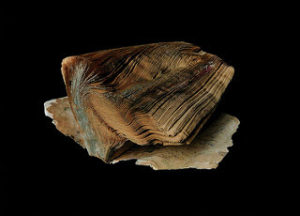 Using historical photographic processes, Kari Orvik creates images that visually connect contemporary San Francisco to its past. With found paper and clear and colored glass as her substrates, and photographic chemicals from the Household Hazardous Waste Program, Orvik’s photographs are both physically fragile objects as well as metaphors for the precariousness and fragility of life in the City.
Using historical photographic processes, Kari Orvik creates images that visually connect contemporary San Francisco to its past. With found paper and clear and colored glass as her substrates, and photographic chemicals from the Household Hazardous Waste Program, Orvik’s photographs are both physically fragile objects as well as metaphors for the precariousness and fragility of life in the City.
Orvik’s subjects include materials discarded from household and industrial spaces, and personal items such as a teenager’s spiral binder from the 1980s embellished with drawings and song lyrics—including the lyrics that serve as the title for the exhibition. She has built a large-format camera in which larger pieces of paper and glass—some cut from shower doors—can be exposed, and will use it to create panoramic images of these items, as well as the Recology facility and surrounding landscape. Additional work includes a series of color prints of scavenged objects, and colored texture studies on paper using emulsions created from printer toner pigments and found negatives.
Orvik has been an artist-in-residence at Rayko Photo Center, a graduate fellow at the Headlands Center for the Arts, and a recipient of an Individual Artist Grant from the San Francisco Arts Commission. She has exhibited in the Bay Area at the San Jose Institute of Contemporary Art, SF Camerawork, the Luggage Store Gallery, Galería de la Raza, and the San Francisco Arts Commission Gallery at City Hall. She received an MFA from the University of California, Berkeley, and teaches at City College of San Francisco. Orvik operates a tintype portrait studio (kariorvik.com) in San Francisco’s Outer Mission District.
Rabbit Garcia
Luggage
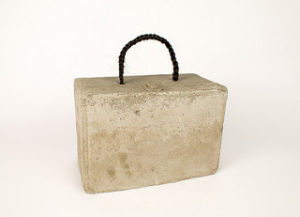 Rabbit Garcia creates a series of works based on suitcases, bags, and other containers used to hold and transport personal effects. Black plastic trash bags serve as inspiration for a group of sculptures Garcia has carved from Styrofoam, then sealed and painted in vivid colors. The bag-like shapes vary in size and rest on different found objects, such as table legs. Other works are made from concrete cast in molds of suitcases and boxes. Using materials ranging from the incredibly light to the surprisingly heavy, Garcia creates artworks that suggest the differences in what each of us metaphorically carries.
Rabbit Garcia creates a series of works based on suitcases, bags, and other containers used to hold and transport personal effects. Black plastic trash bags serve as inspiration for a group of sculptures Garcia has carved from Styrofoam, then sealed and painted in vivid colors. The bag-like shapes vary in size and rest on different found objects, such as table legs. Other works are made from concrete cast in molds of suitcases and boxes. Using materials ranging from the incredibly light to the surprisingly heavy, Garcia creates artworks that suggest the differences in what each of us metaphorically carries.
At a young age, Martin Olivares, aka Rabbit Garcia, learned the tradition of piñata making from his grandmother. This experience informs his interest in sculptural fabrication, and he sees his work rooted in the objects he made as a child. He is interested in the social and cultural factors that fracture environments, and his goal is to reconstruct these broken pieces to retell histories. Recent work has addressed the Tenderloin neighborhood where he has lived for the past five years. Garcia also explores issues of class, queer identity, and the use of social media. He is currently a student at San Francisco City College.
Hughen/Starkweather
Black Gold
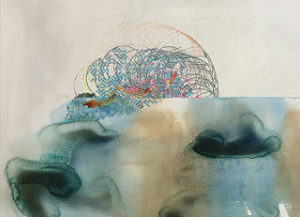 Hughen/Starkweather continue their investigation into climate change in their new series, Black Gold, made during a special residency at Recology San Francisco. In these works, the artists examine the environmental impact of food systems, focusing on food packaging and food waste. The term Black Gold refers simultaneously to compost (which sequesters carbon in the soil, removing it from the atmosphere) and to petroleum (a primary ingredient in plastic).
Hughen/Starkweather continue their investigation into climate change in their new series, Black Gold, made during a special residency at Recology San Francisco. In these works, the artists examine the environmental impact of food systems, focusing on food packaging and food waste. The term Black Gold refers simultaneously to compost (which sequesters carbon in the soil, removing it from the atmosphere) and to petroleum (a primary ingredient in plastic).
Their research has included questions such as: What are the environmental and biological impacts of individual choices about food consumption, including food packaging, disposal, and transport? Can composting food instead of sending it to landfill mitigate climate change? The resulting abstract works on paper utilize the outlines of discarded plastic food packaging to create new forms referencing landscapes, molecular structures, and biochemical and biological processes. The artists do not attempt to offer solutions in these artworks, but hope to prompt questions and new perspectives on an increasingly urgent topic.
Hughen/Starkweather is the collaboration of artists Jennifer Starkweather and Amanda Hughen, who have worked as a team since 2006. Together they have exhibited in San Francisco at the Asian Art Museum, the Public Policy Institute of California, the University of San Francisco, and the Contemporary Jewish Museum. Their commission to create a permanent public artwork embedded in the glass exterior and roof deck of the Union Square Central Subway Station in downtown San Francisco will open in 2019. Hughen received an MFA from UC Berkeley and has been an artist-in-residence at the deYoung Museum and the Headlands Center for the Arts. Starkweather received an MFA from Tyler School of Art in Philadelphia and has been an artist-in-residence at the Ucross Foundation in Wyoming and the Skowhegan School of Painting and Sculpture in Maine.
When:
Reception-Friday, September 21, 2018, 5-8pm (Bonanza fashion shows at 6 and 7pm)
Reception-Saturday, September 22, 2018, 1-3pm
Additional viewing hours-Tuesday, September 25, 2018, 5-7pm with gallery walk-through with artists at 6pm at 401 Tunnel Avenue
Where:
Art Studio, 503 Tunnel Avenue and Environmental Learning Center, 401 Tunnel Avenue, San Francisco, CA
Admission is free and open to the public, all ages welcome, wheelchair accessible.
About the Recology Artist in Residence Program
The Artist in Residence Program at Recology San Francisco was established in 1990 to encourage the conservation of natural resources and instill a greater appreciation for the environment and art in children and adults. Artists work for four months in studio space on site, use materials recovered from the Public Reuse and Recycling Area, and speak to students and the general public. Over 170 Bay Area artists have completed residencies. Applications are accepted annually, June through August.
Contacts:
Deborah Munk
dmunk@recology.com
Micah Gibson (for hi res images)
mgibson@recology.com
Sharon Spain
sspain@recology.com
http://staging.recology.com/AIR
####